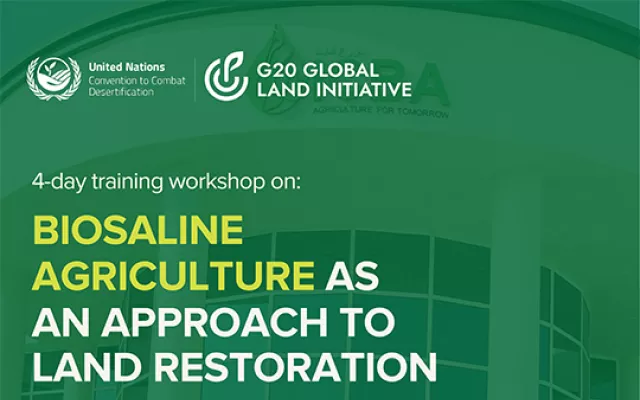UAE Ministry of Foreign Affairs and International Cooperation delegation visits ICBA
27 August 2017
A delegation led by H.E. Sultan Al Shamsi, Assistant Minister of Foreign Affairs and International Cooperation for International Development Affairs, UAE, visited the headquarters of the International Center for Biosaline Agriculture (ICBA) on 27 August 2017 to learn about the center’s research for development activities and discuss opportunities for collaboration.
The delegation was received by Professor Abdulrahman Sultan Alsharhan, Chair of the ICBA Board of Directors, and Dr. Ismahane Elouafi, ICBA’s Director General. During his visit, H.E. Sultan Al Shamsi interacted with ICBA’s senior management and scientists.
Dr. Ismahane Elouafi presented an overview about ICBA’s work in different areas such as the assessment of natural resources in marginal environments, climate change impact and management, aquaculture and bioenergy, capacity development, strategic alliance, and knowledge hubs such as the Modeling and Monitoring Agriculture and Water Resources for Development (MAWRED) knowledge hub.
Following the presentation, the delegation toured ICBA’s research facilities, including date palm experimental fields, greenhouses and net-houses, and the Integrated Aqua-Agriculture System.
During the tour, the delegation also learnt about ICBA’s genebank, which houses around 13,000 accessions of over 250 plant species from more than 150 countries. The delegation also visited the Emirates Soil Museum which has a collection of outdoor and indoor exhibits and serves as a unique hub of soil information in the UAE.
H.E. Sultan Al Shamsi said: “I’m very pleased to see how ICBA through its innovative research work is helping farming communities in developing countries and supporting them to achieve their national plans and goals to enhance their food production system. It is a great pleasure to visit this remarkable research center and learn about its valuable work on water management, salt- and climate-resilient crops. I would like to congratulate ICBA on hosting impressive research facilities, particularly the ICBA genebank of salt-tolerant plants and the Emirates Soil Museum."
During the tour, Dr. Ismahane Elouafi briefed the delegation about the importance of ICBA-led research initiatives such as saving freshwater resources through cultivation of salt-tolerant forage grasses, using treated wastewater for agriculture, using energy-efficient net-houses and integrated aqua-agriculture systems.
Since its inception in 1999, ICBA has evolved into a world-class organization with an international team of scientists who specialize in natural resources management, water and soil salinity management, crop diversification, climate change adaptation, aquaculture and policy development. Through its programs in different countries, ICBA assists a wide range of stakeholders, including farmers and policymakers, in dealing with water scarcity and food insecurity.












